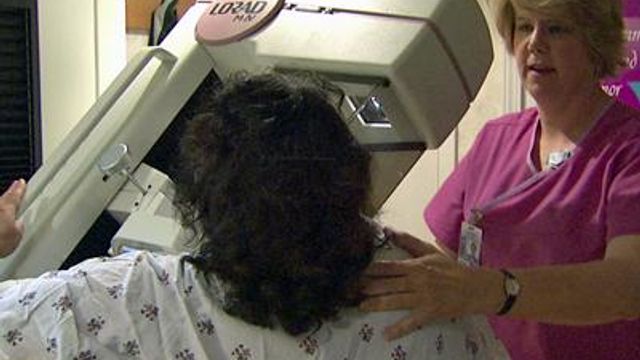Health Team
Breast cancer screenings recommended for former radiation patients
Women who underwent chest radiation to treat cancer when they were young adults or children are at a greater risk to get breast cancer. That's why, several years after radiation, researchers recommend regular breast-cancer screenings, annual mammograms and a breast MRI.
Posted — UpdatedWomen who underwent chest radiation to treat cancer when they were young adults or children are at a greater risk to get breast cancer. That's why, several years after radiation, researchers recommend regular breast-cancer screenings, annual mammograms and a breast MRI.
More than 20,000 women in the United States have received chest radiation to treat cancer earlier in their lives.
The Children's Oncology Group now recommends breast-cancer screening starting at age 25 – or eight years after their radiation – with annual mammograms and a breast MRI.
“If we can diagnose breast cancer in an early stage in these women, their outcomes are good,” Dr. Kevin Oeffinger of Memorial Sloan-Kettering Cancer Center in New York City said.
In a study published in the Journal of the American Medical Association, researchers asked 550 high-risk women about their screening habits.
Thirty-six percent of women ages 25 to 39 in the survey said they had undergone a mammogram in the previous two years. Forty-seven percent of women in that age group had never had a mammogram.
A little more than half of women ages 40 to 50 had regular screenings. All women of normal risk are told to start by age 40.
Researchers say doctors can help raise awareness.
“If a physician recommended screening for these women, especially those women between the ages of 25 to 39, they were three times more likely to have a mammogram than those women that didn't have a physician recommendation,” Oeffinger said.
Meg Owen, who had chest radiation to overcome Hodgkin’s lymphoma twice in her early 20s, said knowing that she is at a higher risk has helped.
“For me, knowledge is power,” Owen said. “The screening actually gives me peace of mind.”
Researchers are now looking for the best ways to distribute guideline information directly to patients and doctors, hoping to get more women into regular breast-cancer screening.
• Credits
Copyright 2024 by Capitol Broadcasting Company. All rights reserved. This material may not be published, broadcast, rewritten or redistributed.





